Marketing, in its simplest form, is about connecting with people and understanding their needs. Yet, as technology advances and consumer behaviour shifts, marketing has evolved into something much more complex and dynamic. Whether it’s crafting compelling content for a website or creating a brand experience in a store, marketing permeates every part of a business. It’s not just about selling a product or service anymore; it’s about creating value and fostering long-term relationships with customers.
But what exactly is the scope of marketing? How broad is its reach, and what does the future hold for the industry? This blog will delve into these questions, exploring what marketing really means, its nature, the extensive scope of marketing, why it’s so important, its future, and the exciting career opportunities in the field. By the end of this guide, you’ll understand why marketing is such a powerful tool for businesses today.
Table of Contents
What is Marketing?
At its core, marketing is the process by which companies engage with their target audience to promote their products or services. It encompasses a wide range of activities such as advertising, market research, branding, sales, and distribution. While many people think of marketing as just advertising, it’s much more than that. Marketing starts long before a product hits the shelves and continues well after a sale is made. It’s a multifaceted discipline that’s essential for driving business growth.
Marketing can be described as the art and science of profitably meeting customer needs. It involves understanding what customers want, designing products or services that meet those wants, and then communicating that value to customers in a way that compels them to take action.
Also Read: What is Growth Marketing?
The Role of Marketing in Business
The importance of marketing in business is more important than ever today. Without it, even the best products would go unnoticed. It helps companies understand customer needs, develop strategies to meet those needs, and ultimately persuade consumers to make a purchase.
- Creating Value: Marketing begins with creating value. This means identifying the unmet needs of consumers and finding ways to solve their problems through innovative products or services.
- Building Relationships: Successful marketing is about more than making a sale; it’s about building long-term relationships with customers. By engaging with customers at every stage of their journey, businesses can foster loyalty and trust.
- Generating Awareness: Without marketing, it’s difficult for consumers to know about a product or service. Whether it’s through digital ads, social media posts, or word-of-mouth, marketing ensures that potential customers are aware of what’s available to them.
Also read: Marketing vs Advertising
The Nature of Marketing
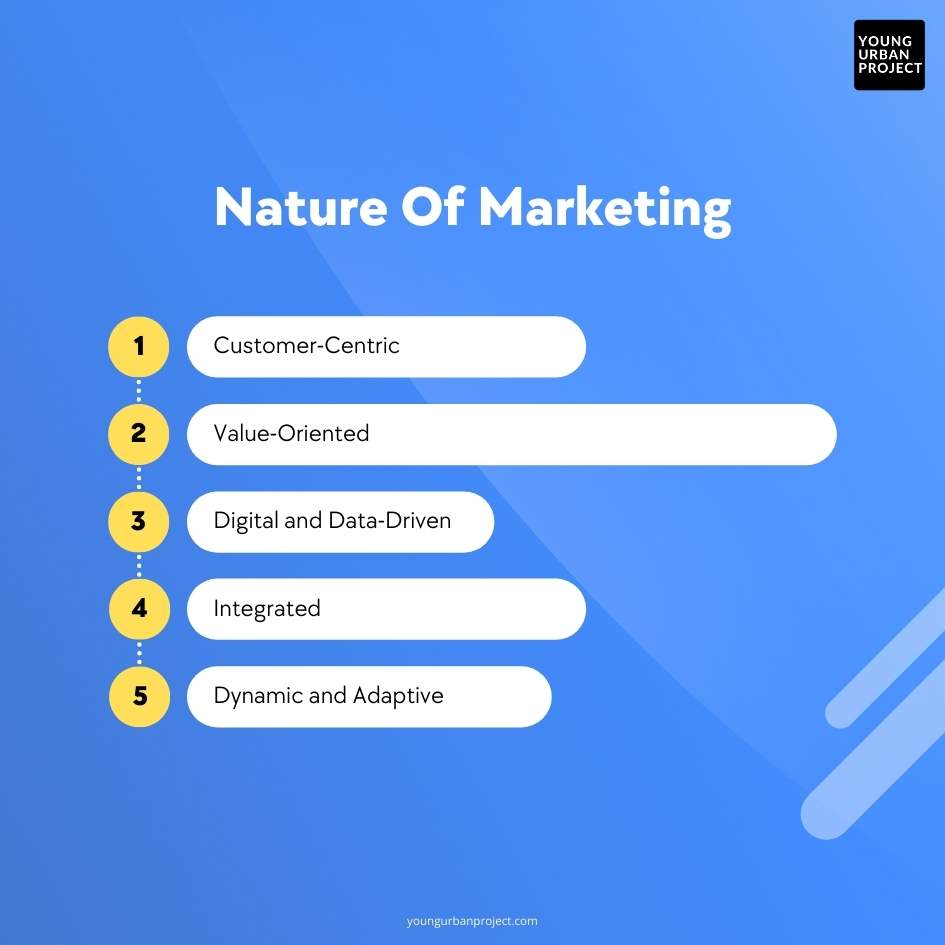
Marketing is not a static field. It’s dynamic, adaptive, and ever-evolving. It adjusts to changes in consumer behaviour, technological advancements, and market trends. Let’s explore some of the key characteristics that define the nature of marketing today.
1. Customer-Centric
In the modern marketplace, the customer is at the centre of every marketing effort. Marketers need to deeply understand their audience’s needs, pain points, and preferences. This approach shifts the focus from the company’s products to the customer’s experience, resulting in more personalized and effective marketing strategies.
2. Value-Oriented
Today’s marketing is all about value. Customers want more than just a product; they want an experience. Marketers must create value that resonates with their audience, whether through the product itself or the overall brand experience. This is where value propositions become essential—marketers must clearly communicate why their product is the best solution for the customer’s problem.
3. Digital and Data-Driven
The rise of digital platforms has revolutionized the marketing landscape. Marketers now have access to unprecedented amounts of data that can be analyzed to understand consumer behavior, predict trends, and personalize marketing efforts. Digital marketing includes everything from search engine optimization (SEO) and social media marketing to email campaigns and pay-per-click advertising.
4. Integrated
Marketing is no longer limited to one channel. The nature of marketing today is highly integrated, meaning businesses use multiple channels—both online and offline—to reach their target audience. Whether it’s a social media ad, a billboard, or an email campaign, all touchpoints should work together cohesively to create a seamless brand experience.
5. Dynamic and Adaptive
Consumer preferences, technologies, and market conditions are constantly evolving, and marketing must adapt accordingly. This means being agile and ready to shift strategies when new trends or opportunities arise. Brands that fail to stay flexible risk becoming irrelevant.
Enroll Now: Performance Marketing Training
The Scope of Marketing
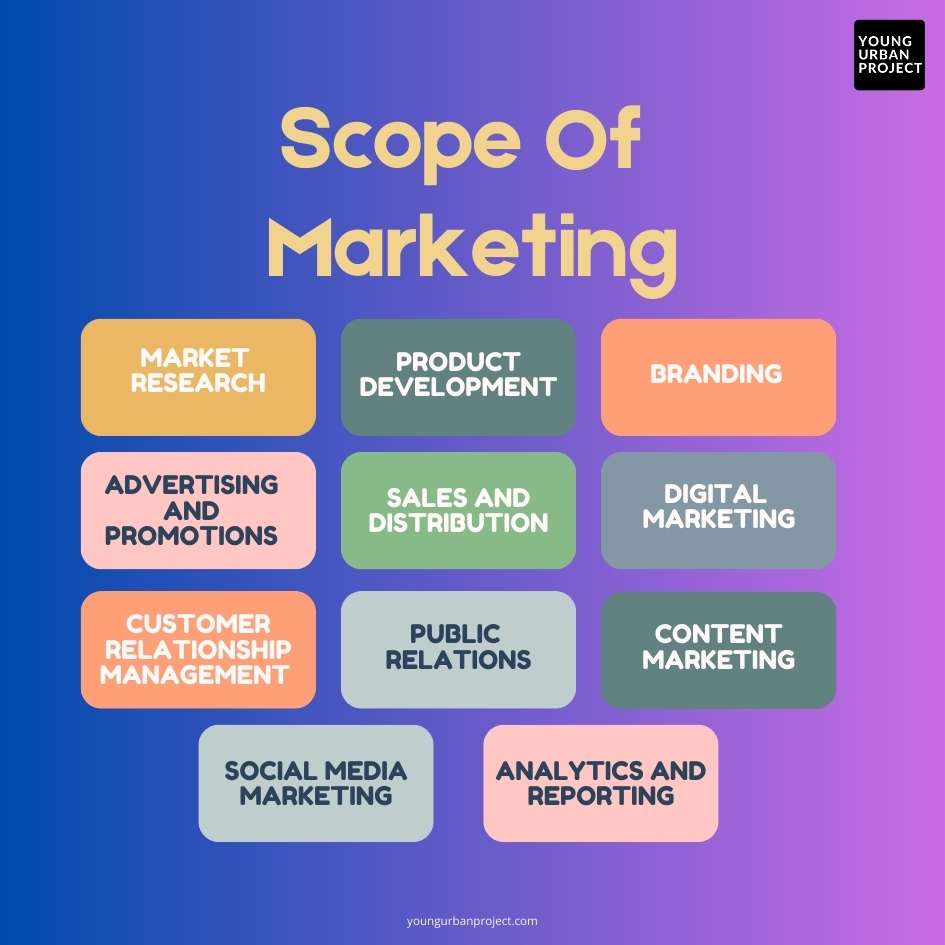
When we talk about the scope of marketing, we’re referring to all the different areas that marketing encompasses. It’s not just about promotions or ads; marketing touches every aspect of a business, from product development to customer relationship management. Let’s break down the extensive scope of marketing into its key components.
1. Market Research
Understanding your audience is the first step in any marketing strategy. Market research involves gathering and analyzing data to identify the needs and preferences of your target customers. This can be done through surveys, focus groups, customer feedback, and analytics tools. By knowing your market, you can tailor your products, services, and messages to better meet customer needs.
Also Read: Scope of Marketing Research
2. Product Development
Marketing plays a crucial role in product development. It’s not enough to create a product and hope it sells; marketers must work closely with the product development team to ensure that the product meets customer needs. This involves identifying market gaps, developing features that provide value, and testing the product with real users before launching. To turn these insights into functional solutions, many businesses choose to hire software developers who can bring the vision to life with precision and scalability.
3. Branding
Branding is one of the most critical aspects of marketing. It’s about creating a unique identity that sets your business apart from competitors. A strong brand helps build trust and loyalty with customers. This includes your company’s logo, tagline, colors, and the overall message you convey to your audience.
4. Advertising and Promotions
While advertising is just one piece of the marketing puzzle, it’s an essential one. It includes all the methods you use to promote your products or services to consumers. This could be through digital ads, TV commercials, print ads, or influencer marketing. Promotions, on the other hand, involve offering discounts, special deals, or limited-time offers to encourage sales.
5. Sales and Distribution
Marketing is also responsible for determining how and where products will be sold. This involves choosing the right distribution channels—whether that’s online stores, physical retail locations, or a mix of both. The goal is to make it as easy as possible for customers to purchase your products.
6. Digital Marketing
In today’s world, digital marketing is a vital component of the overall marketing strategy. This includes everything from search engine optimization (SEO) and content marketing to social media and email marketing. As more consumers spend time online, businesses must ensure they have a strong digital presence to stay competitive.

7. Customer Relationship Management (CRM)
Marketing doesn’t end with a sale. Building and maintaining strong relationships with customers is key to long-term success. CRM systems help businesses manage customer interactions, track behavior, and deliver personalized experiences that keep customers coming back.
Also Read: Scope of Digital Marketing
8. Public Relations (PR)
Public relations is another essential part of marketing. It’s all about managing a company’s reputation and building a positive public image. This could involve handling media relations, responding to crises, and communicating with stakeholders through press releases or interviews.
9. Content Marketing
Content marketing is all about creating valuable, relevant content to attract and engage your audience. This could be through blog posts, videos, infographics, or podcasts. The goal is to educate, entertain, and build trust with potential customers without directly selling to them.
10. Social Media Marketing
Social media has transformed the way businesses interact with customers. Platforms like Facebook, Instagram, LinkedIn, and Twitter allow brands to engage with their audience in real-time, building relationships and fostering loyalty. Social media marketing involves creating content, running ads, and engaging with followers to grow your brand’s presence.
11. Analytics and Reporting
One of the advantages of digital marketing is the ability to measure results in real-time. Marketers can track the performance of their campaigns using analytics tools, which provide insights into consumer behavior, engagement, and conversion rates. This allows marketers to optimize their strategies for better results.
Also read: Scope of Social Media Marketing
The Importance of Marketing
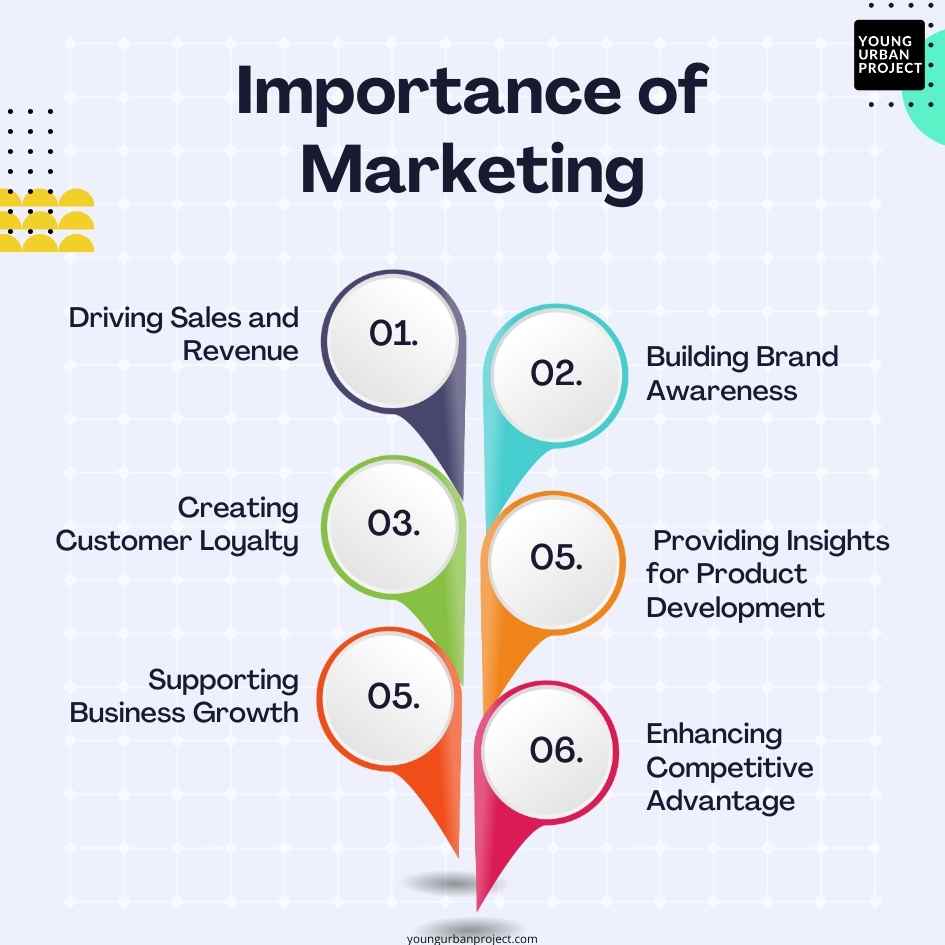
Marketing is essential for any business that wants to succeed. It’s the engine that drives awareness, engagement, and sales. Let’s look at why marketing is so crucial in today’s competitive business environment.
1. Driving Sales and Revenue
Marketing generates awareness for your product or service, attracting potential customers and driving sales. Without marketing, even the best products would go unnoticed. Whether through digital campaigns or in-person events, marketing ensures that your target audience knows about your offerings and is encouraged to take action.
2. Building Brand Awareness
A strong marketing strategy helps build brand recognition, making your business stand out in a crowded marketplace. When consumers are aware of your brand, they’re more likely to choose you over competitors. Consistent branding across all touchpoints helps create a memorable identity that sticks with consumers.
3. Creating Customer Loyalty
Marketing helps build relationships with customers, turning first-time buyers into loyal advocates. Through personalized experiences, rewards programs, and engaging content, businesses can foster loyalty and keep customers coming back for more.
4. Providing Insights for Product Development
Marketing is also essential for gathering feedback and insights that inform product development. By understanding customer preferences, businesses can create products that better meet market demands. This ensures that the company remains competitive and continues to grow.
5. Supporting Business Growth
Marketing fuels business growth by increasing customer acquisition, retention, and revenue. Whether you’re a startup or an established enterprise, marketing helps you scale by attracting new customers and expanding into new markets.
6. Enhancing Competitive Advantage
In a competitive marketplace, businesses must differentiate themselves to succeed. Effective marketing helps set your brand apart from competitors, highlighting your unique value proposition. This can be through innovative campaigns, superior customer service, or product quality.
Also read: Scope of Advertising
The Future of Marketing
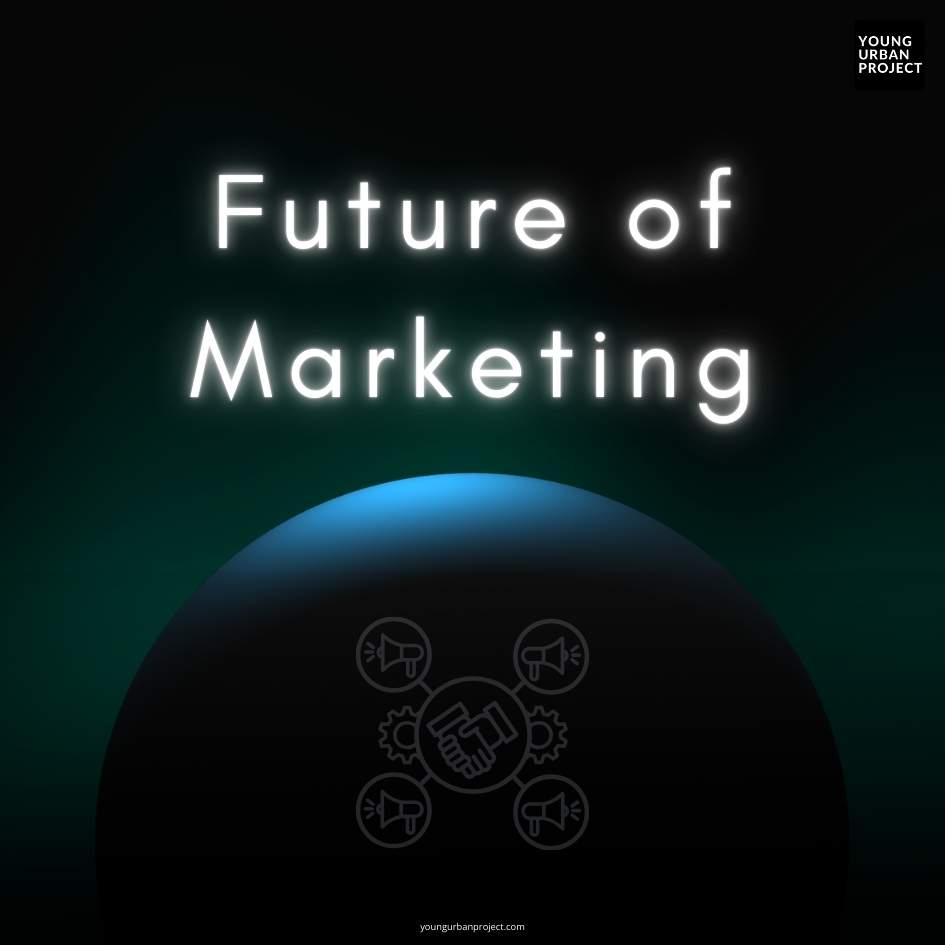
As technology continues to evolve, so does the marketing landscape. The future of marketing will be shaped by innovations such as artificial intelligence, machine learning, and automation. Here are some key trends to watch:
1. Artificial Intelligence (AI) and Automation
AI and automation are already transforming how businesses approach marketing. From chatbots that provide instant customer service to algorithms that personalize content, AI helps marketers become more efficient and effective. In the future, AI will play an even bigger role in areas like predictive analytics, audience targeting, and campaign optimization.
2. Personalization at Scale
Consumers expect personalized experiences, and companies are finding ways to deliver on that expectation. The future of marketing lies in hyper-personalization, where businesses can deliver tailored messages, products, and services to individuals based on their behavior and preferences. This will be driven by data analytics, AI, and machine learning.
3. Voice Search and Virtual Assistants
As devices like Amazon’s Alexa and Google Assistant become more popular, voice search is expected to play a larger role in how consumers find information. Marketers will need to optimize their content for voice search and understand how virtual assistants can be used to engage customers.
4. Sustainability and Social Responsibility
Consumers are increasingly looking to support brands that prioritize sustainability and social responsibility. The future of marketing will require businesses to adopt more transparent, ethical practices and communicate their commitment to environmental and social issues.
5. Augmented Reality (AR) and Virtual Reality (VR)
AR and VR are set to revolutionize the way consumers interact with brands. Whether it’s trying on clothes virtually or visualizing how furniture looks in a room, AR and VR provide immersive experiences that can enhance marketing efforts. Brands that invest in these technologies will have a competitive edge in the future.
Also read: What Is the Service Marketing Triangle and How Does It Work?
Career Opportunities in Marketing
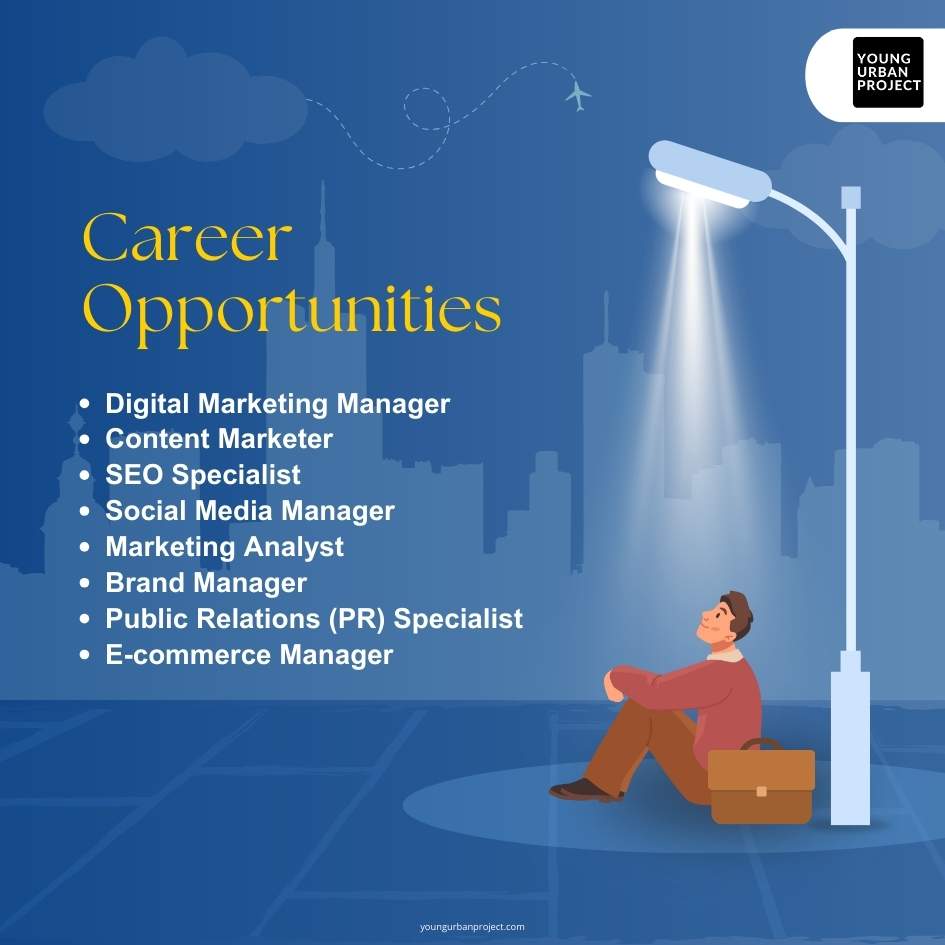
The wide scope of marketing translates into diverse career opportunities. Whether you’re a creative thinker, a data-driven analyst, or a strong communicator, there’s a role for you in marketing.
According to Statista, the number of marketing professionals hired across India was about 4,226 in June 2024.
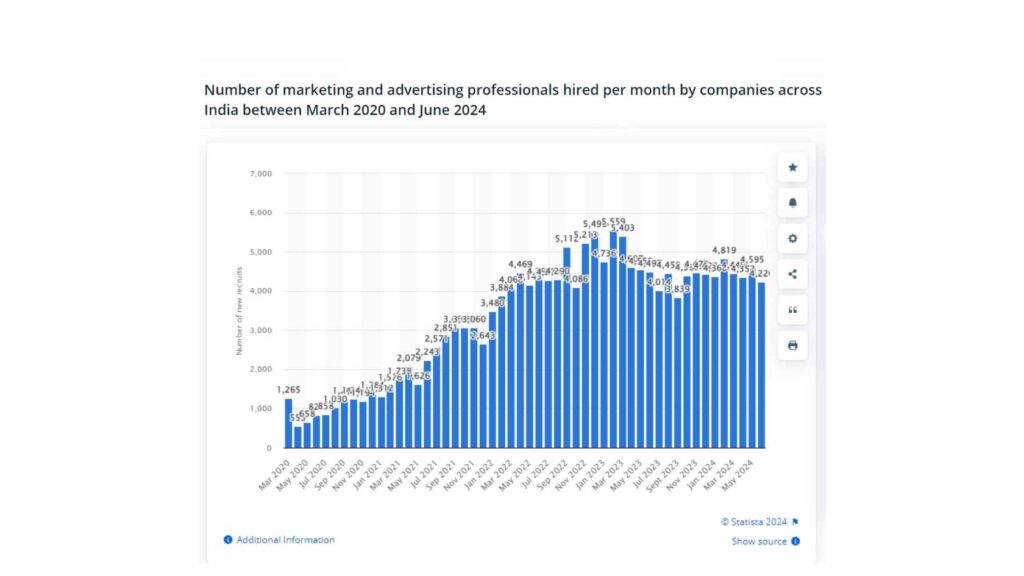
1. Digital Marketing Manager
Digital marketing managers oversee online marketing strategies, including SEO, SEM, social media, email marketing, and content marketing. They are responsible for driving traffic, generating leads, and increasing sales through digital channels.
2. Content Marketer
Content marketers create and distribute valuable, relevant content to attract and engage a target audience. This includes blog posts, videos, infographics, podcasts, and social media content. Content marketing helps build brand authority and trust with consumers.
3. SEO Specialist
An SEO specialist focuses on optimizing websites to rank higher in search engine results. They use strategies like keyword research, link building, and on-page optimization to improve a site’s visibility and attract organic traffic.
4. Social Media Manager
Social media managers create and implement strategies to grow a brand’s presence on platforms like Facebook, Instagram, LinkedIn, and Twitter. They engage with followers, run paid campaigns, and analyze performance metrics to optimize social media efforts.
5. Marketing Analyst
Marketing analysts use data to evaluate the performance of marketing campaigns. They provide insights into customer behavior, campaign ROI, and overall marketing effectiveness. This role is highly analytical and requires strong skills in data analysis and reporting.
Also read: The Scope of Marketing Analytics
6. Brand Manager
Brand managers are responsible for creating and maintaining a brand’s identity. They oversee all branding efforts, from product packaging to advertising campaigns, ensuring that the brand’s message is consistent and resonates with its target audience.
7. Public Relations (PR) Specialist
PR specialists manage a company’s public image and reputation. They handle media relations, write press releases, and organize events to build positive relationships with stakeholders and the public.
8. E-commerce Manager
E-commerce managers oversee online sales platforms and strategies. They are responsible for managing the user experience, driving traffic to the site, and increasing conversion rates. E-commerce is a fast-growing area of marketing as more consumers shop online.
Also read: The Difference Between Selling and Marketing
Conclusion
The scope of marketing is vast and ever-expanding. From traditional methods like advertising and branding to modern techniques such as digital marketing and AI, marketing plays a critical role in business success. Its ability to adapt to changes in technology and consumer behavior makes it one of the most exciting fields to work in.
For individuals looking to pursue a career in marketing, the opportunities are endless. Whether you’re interested in data analytics, content creation, or social media, there’s a role for everyone in this dynamic industry. As businesses continue to evolve, so too will the scope of marketing, making it an essential part of the business world for years to come.

